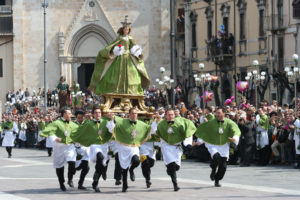
On my onomastica or name day, the feast of my Confirmation patroness St. Elizabeth of Hungary, my friend Anne gave me a blank paper fan to decorate.
I mused aloud about possible designs. “Noah’s Ark? Our Lady of Guadalupe?”
“I know, I’ll make it a prayer fan! I’ll write all the names of people I’m praying for!”
“Jean, what a wonderful idea! We have to patent it,” Anne said, chuckling.
My nuclear family is scattered over three continents, with my brother in Egypt, my parents in Singapore, and me in Australia. Some days, I experience a guilty jolt when I realize that I haven’t consciously prayed for my parents, brother, and godchildren by name for awhile, though they are included in the catch-all clause of my Morning Offering.
As humans, we can only concentrate on a finite number of things. Sometimes even the most important things slip our minds, especially in the busyness of modern life.
As Catholics, knowing that the body and soul must work in unison, we rely on sacramentals as visible signs of our faith, physical reminders to live the Christian life.
Books too may act as sacramentals:
Even libraries and bookcases themselves become sensible signs of the truth and of the high vocation to caritas in veritate. St. Epiphanius, a Palestinian monk and later bishop of Cyprus, took the view that acquiring Christian books was not merely helpful but “necessary for those who can use them. For the mere sight of these books renders us less inclined to sin, and incites us to believe more firmly in righteousness.”
— Fr. Bernard & Abbot Michael Zielinski, OSB Oliv., “Book, Libraries, and the Church”
 Recently, another friend and I wandered into a Protestant church. There in a corner were two wooden crosses, one criss-crossed with strings on which to peg prayer intentions, and one standing behind flickering candles.
Recently, another friend and I wandered into a Protestant church. There in a corner were two wooden crosses, one criss-crossed with strings on which to peg prayer intentions, and one standing behind flickering candles.

“So much for chucking out man-made traditions!” I observed.
You see — we are enfleshed souls. We humans need physical, sensible objects to demonstrate our spiritual intentions. Incense, music, sacred art, architecture, bread and wine, gestures — all these are manifestations of God’s beauty and creative genius working through His entire creation, including our bodies. Jesus didn’t have to make a paste out of dirt and spittle in order to heal the blind man — He could have just willed it — but He chose to work a miracle through the lowliest bits of God’s creation. (Again, dirt and spittle. Not something I’d want on my eyes.)
So, God, I hope You understand when I get weary, and simply pray: “Please touch all the people whose names are on my fan!”
I’m talking about Sanctification – making things holy. Or more accurately, turning things over to God, to be used for His purposes. Catholics do this all the time – usually with the help of a priest. We do it to metals, strings of beads, necklaces – things that for non-Catholics are jewelry, we have blessed, made holy, sanctified, and voilà! They’re sacramentals now!
— “Sanctification”, Stuff Catholics LikeIt is superstition to put one’s hope in formalities; but it is pride to be unwilling to submit to them. The external must be joined to the internal to obtain anything from God, that is to say, we must kneel, pray with the lips, etc., in order that proud man, who would not submit himself to God, may be now subject to the creature. To expect help from these externals is superstition; to refuse to join them to the internal is pride.
— Blaise Pascal, Pensees, Section IV (Of the Means of Belief), #249-250





1 thought on “Making a Prayer Fan: Sacramentals”
Pingback: Sacramentals: holy gifts - IGNITUM TODAY : IGNITUM TODAY